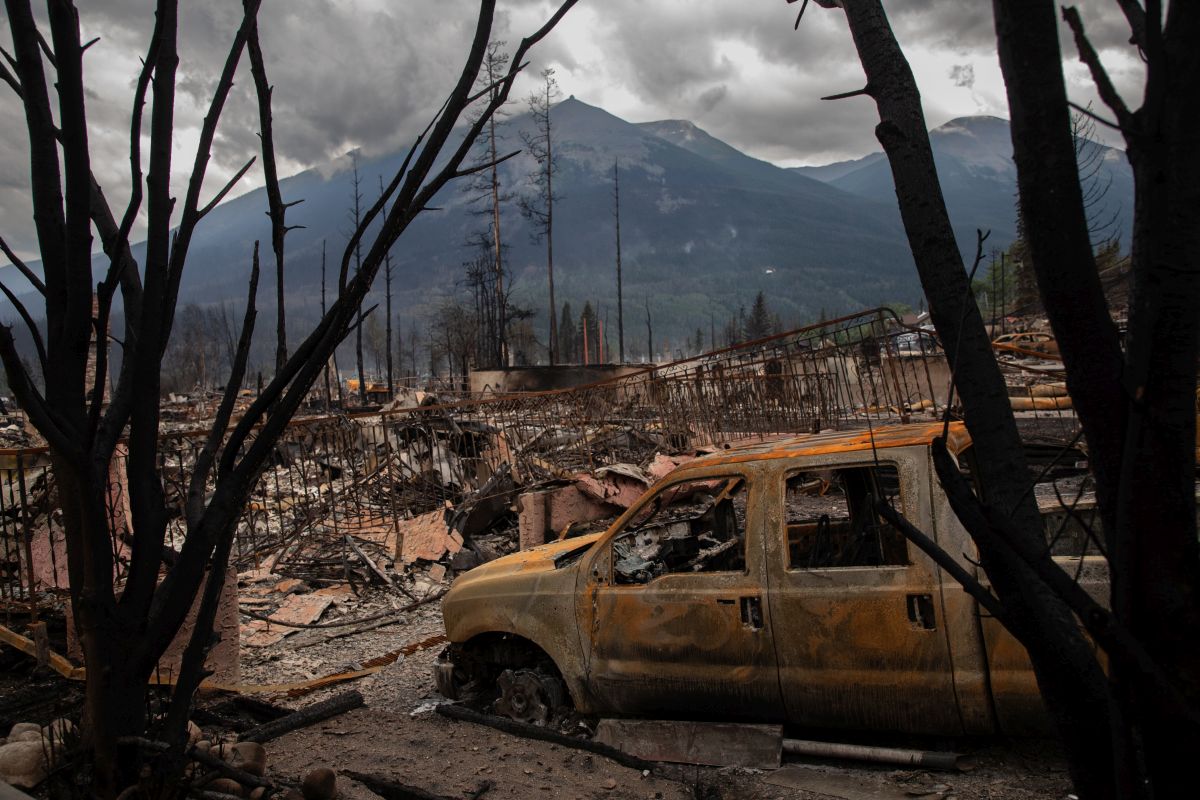Greenpeace Canada, Environmental Defence Canada and Ecojustice are among 80 organizations that have signed an open letter calling on the federal government and other lawmakers to take further action on climate change in the wake of this summer’s wildfires that destroyed part of the townsite in Jasper National Park.

“The lives of the people in Jasper, a mountain town beloved by Canadians, a place so many of us have spent time in, have been devastated because of a fast-spreading wildfire,” reads a portion of the letter dated Aug. 1. “Our hearts go out to the people of Jasper and all of the communities and Indigenous nations facing evacuation, the loss of their homes, businesses and traditional lands. We grieve with them during this unimaginably difficult time.
“To the leaders of governments in Canada, we have a different message: how many more of our communities need to burn before our leaders act with the urgency required?”
Two days before a wildfire entered the Jasper townsite last month, about 25,000 people were forced to flee the national park after an evacuation order was issued.
Thursday’s open letter calls on politicians to take “decisive action on climate change,” a phenomenon that scientists have warned for years is leading to longer and more intense heat waves as well as increasing the risk of more destructive wildfires.
The groups who signed Thursday’s open letter said they want governments to take further steps to reduce greenhouse gas emissions, highlighting the impact of the fossil fuel industry in particular.
The letter calls for regulations so that oil and gas companies are required to “sharply reduce their emissions” and for politicians to take steps to address “the financial institutions that bankroll them, so that devastating wildfires, heat domes and floods don’t continue to worsen across this country.”

Steven Guilbeault, the federal minister of environment and climate change, spoke at a news conference in Alberta on Thursday relating to the Jasper wildfire and was asked about the letter.

Get breaking National news
“We know that more needs to be done, and that’s what we’re actively engaged, working with our partners — provinces, territories, municipalities, private sector, Indigenous nations,” he said. “I should also mention the fact that we have now the first-ever national adaptation plan, again working with municipalities, with provinces, territories, Indigenous leaders (and) the private sector to see how we will adapt to a changing climate in Canada.
“Our plan is working. Our emissions are coming down but we have to do that in a way that helps communities, helps workers and supports the economy. And that’s exactly what we’re doing.”
Guilbeault described his government’s strategy for combating climate change as “the most comprehensive plan” in the history of Canada, something he suggested is needed given current challenges.
“Clearly we are seeing an increase in the number and severity of forest fires in Canada and across the world, as well as other natural catastrophes,” he said.
Todd Loewen, Alberta’s minister of forestry and parks, was also asked about the letter on Thursday. He acknowledged that when it comes to wildfires, the province has had “two big years in a row.”
“Last year, 2.2. million hectares of land burned in Alberta,” he said, noting that is a provincial record. “This year here, we’ve only had about 25 per cent of what we’ve had burned last year.
“There’s been a dramatic change that’s been fluctuating over time when it comes to the amount of land burned. When you look at our forests, our forests are aging. We’ve been fighting forest fires in Alberta for over 90 years now and that’s created a forest that’s aged and that’s ready to burn.”
Loewen said Alberta has “a landscape now that’s ready to burn” and that his government will need to take steps to “manage that.”

On the subject of the fossil fuel industry, he said the “oil and gas industry in Canada, and particularly in Alberta, is doing a fantastic job when it comes to emissions reductions.”
“It’s the model for the world to follow and I think the rest of the world should follow what we’re doing here in Alberta,” Loewen said.
Global News reached out to Alberta’s ministry of environment and protected areas for comment on the open letter. In its response, the ministry said “it is shameful to see so-called ‘environmental organizations’ attempting to politicize the wildfire in Jasper while it’s being fought.”
“This is tone deaf, and completely disrespectful to those impacted by current wildfires in our province,” the statement read in part. “We can proudly say Alberta’s record on environmental stewardship and emissions reduction is second to none. For instance, right now, Alberta’s overall emissions are declining.
“Alberta’s approach is working successfully. We will continue to lead the way on reducing emissions, creating jobs and keeping the economy strong as we work to reach carbon neutrality by 2050.”
In November, Premier Danielle Smith said she would be using Alberta’s Sovereignty Act for the first time to challenge the federal government’s requirements to have a net-zero electricity grid by 2035.
She said her government plans to reach the net-zero goal by 2050 because Ottawa’s 2035 goal could wreak havoc on Alberta’s natural gas-based grid.
“We’re creating an opportunity for the federal government to do the right thing and back down,” she said at the time. “We’re sending the message: ‘Keep working with us on our 2050 target.'”
Last summer, Guilbeault released draft regulations to establish a net-zero energy grid by 2035.
–with files from Global News’ David Baxter











Comments
Want to discuss? Please read our Commenting Policy first.